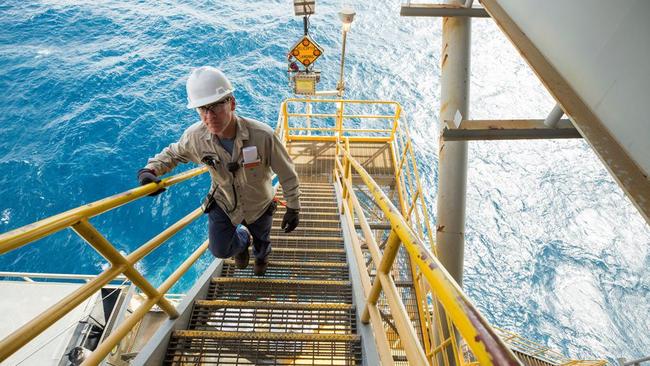Woodside green lights $10.5bn Mexican oil development
The energy major’s final investment decision on Trion comes despite mounting environmental pressure to rein in its spending on new developments.
Oil and gas major Woodside has approved the development of its $US7.2bn ($10.5bn) deep water oil project in the Gulf of Mexico, which it expects to begin production in 2028.
The final investment decision on Trion, of which Woodside said its share would cost $US4.8bn, is the latest expansion plan by the oil and gas company, despite mounting environmental pressure to rein in its spending on new developments.
Woodside said Trion makes excellent financial sense, as its large oil reserves will generate lucrative returns for shareholders. It said the project will deliver a rate of return of more than 16 per cent and the payback period will be less than four years.
Woodside chief executive Meg O’Neill said the project would be beneficial to shareholders and the global energy transitions.
“The investment is aligned with Woodside’s strategy, exceeds Woodside’s capital allocation framework targets and will be a strong contributor to Woodside’s cash flows, shareholder returns and the funding of future developments in oil, gas and new energy,” Ms O’Neill said.
“We have considered a range of oil demand forecasts and believe Trion can help satisfy the world’s energy requirements. Two-thirds of the Trion resource is expected to be produced within the first 10 years after start-up.”

Trion was discovered by Pemex in 2012. It is located at Mexico’s Perdido basin, about 180 km off the Mexican coastline at a depth of 2,500 metres.
Shares in Woodside rose 2.2 per cent on Tuesday, to $36.31, as investors warmly greeted the approval.
Citigroup energy analyst James Byrne said the decision had come earlier than the market expected but the returns on investment were positive.
“Equity investors need to have a greater focus on payback and competitive positioning on the cost curve for greenfield projects, particularly oil … we consider the four-year payback to be attractive in this regard,” Mr Byrne said in a note to clients.
While Ms O’Neill stressed the development’s relatively low carbon dioxide content, the new project drew the ire of environmentalists and proponents of renewable energy.
Will van de Pol, acting CEO of climate advocacy group Market Forces, said Woodside was thumbing its nose at global efforts to curtail emissions.
“Woodside’s decision to push ahead with a new oil field in 2023 is yet another multi-billion dollar bet against the climate goals of the Paris Agreement,” Mr van de Pol said.
“Woodside is showing a complete disregard for investor demands to align with global climate goals, and investors must respond by withdrawing capital from this climate wrecking company.”
Woodside is already in the crosshairs of critics, which accuse the company of hindering global efforts to curtail the use of fossil fuels, though the company insists it supports the move to a low carbon global economy and oil and gas is a transitional fuel.
Woodside has embarked on a series of new developments globally. It is targeting the start-up late this year of its $US4.6bn oil project in Senegal, and is moving quickly to establish its $16.5bn Scarborough LNG project in Western Australia — which remains opposed by environmentalists.
The investment in fossil fuels far exceeds Woodside’s spend on low carbon energy. Woodside has spent about $US100m on potential new opportunities in low-carbon energy, but it insists it is on course to rapidly increase investment to $US5bn to clean energy ventures by 2030.
Woodside is also under pressure from shareholders to demonstrate its commitment to making its net-zero emissions target.
The energy group last year received the largest vote against its Climate Action Transition Plan, with just shy of half of its shareholders voting against the plan.
Woodside and supporters insist the world needs more fossil fuels in the near future, which will offer countries sufficient time to build renewable energy alternatives, and Woodside highlighted the front-loaded benefits of Trion especially.
A recent global energy crunch — fuelled in large part by Russia’s invasion of Ukraine — has sent global prices soaring, and major heavyweights have moved to increase investments in fossil fuels – having previously prioritised renewable energy spending.
Critics insist such investments will slow the global transition towards renewable energy and jeopardise efforts to limit global warming.




To join the conversation, please log in. Don't have an account? Register
Join the conversation, you are commenting as Logout